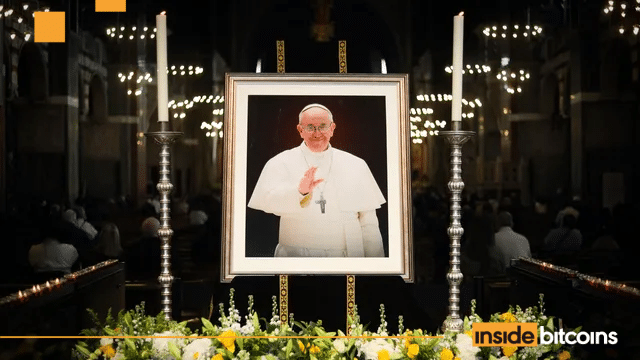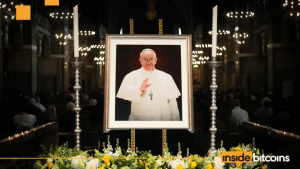Pope Francis, the beloved spiritual leader of 1.3 billion Catholics worldwide, passed away on Monday, April 21, 2025, at the age of 88. His unexpected death, coming shortly after delivering Easter blessings in Vatican City, has not only triggered waves of grief throughout the Catholic community but has also caused significant shifts in an unlikely arena: cryptocurrency-based prediction markets.
The Final Days of a Revolutionary Pontiff
Pope Francis had been struggling with health issues for several months before his passing. The Argentinian-born pontiff, whose birth name was Jorge Mario Bergoglio, had been hospitalized at Rome’s Gemelli Hospital since mid-February 2025, where he experienced what Vatican officials described as episodes of “acute respiratory failure”. Despite undergoing medical procedures to address buildup of secretions following two bronchoscopies, the pope’s condition deteriorated rapidly in his final days.
Francis’s papacy, which began in 2013, marked several historic firsts for the Catholic Church. As the first Latin American to lead the faith, he ushered in a decade of transformative leadership characterized by progressive stances on social justice issues. Throughout his tenure, Francis won admiration for tackling contentious topics including climate change, economic inequality, and advocating for more compassionate approaches toward LGBTQ+ individuals – positions that sometimes put him at odds with more conservative elements within the Church.
The pope had remained active in his duties until nearly the end, maintaining a presence at key liturgical events despite requiring oxygen support and experiencing declining health. His final public appearance, offering Easter blessings just hours before his death, became an unintended farewell to the faithful who had followed his leadership for more than twelve years.
The Ancient Tradition of Papal Betting Meets Modern Technology
While Catholics worldwide began mourning, digital betting markets experienced an immediate and dramatic response. This intersection of faith and finance isn’t actually new – the practice of wagering on papal outcomes dates back centuries, with the first written records of political betting on papal elections appearing as early as 1503. Throughout the 16th and 17th centuries, betting on papal selection was commonplace in Italian city-states, part of a broader culture of wagering on government officials and political outcomes.
What’s different today is the technology. Modern prediction markets have transformed this age-old practice into sophisticated digital platforms where participants can place real-money bets on virtually any conceivable outcome. These markets function as forecasting mechanisms that efficiently aggregate dispersed information among various participants, essentially creating betting structures designed to elicit and consolidate beliefs about future events.
Polymarket, a cryptocurrency-based prediction platform, had been offering multiple betting opportunities related to Pope Francis’s fate since February 2025. Among these “event contracts” were markets on whether Francis would step down before July (given 15% probability by bettors) and whether there would be “a new pope in 2025” – a delicately worded market that essentially asked bettors to predict the pope’s mortality.
Polymarket’s Papal Betting Boom
The papal speculation market on Polymarket had attracted substantial attention even before Francis’s death. By early March, the “New pope in 2025?” contract had already accumulated more than $710,500 in stakes, with bettors giving it a 72% likelihood. Following the announcement of Francis’s passing on Monday morning, these odds surged dramatically from 33% to 99% in just hours.
This prediction market quickly became one of Polymarket’s most active pools, with trading volume reaching nearly $2 million. The platform’s cryptocurrency-based structure allows participants to place bets using digital currencies, operating in a somewhat regulatory gray area compared to traditional betting establishments.
For some participants, the pope’s passing represented significant financial windfalls. One bettor using the handle “syncope” purchased 26,266 shares at an average price of 56 cents, positioning them to earn more than $11,500 on this single wager. This trader’s success wasn’t an isolated incident – reportedly, they’ve accumulated about $182,000 in total profits on the platform over the past year through various prediction markets.
Polymarket also hosts a separate market specifically focused on who will become the next pope. Cardinal Pietro Parolin, who served as the Vatican’s Secretary of State, emerged as the frontrunner with implied odds giving him a 36% chance of election. Cardinal Luis Antonio Tagle from the Philippines also features prominently among potential successors, appealing to those who appreciate Francis’s progressive approach to Church reform.
The Competitive Landscape of Prediction Markets
Polymarket represents just one player in a rapidly evolving prediction market ecosystem. Several competitors have emerged offering variations on the basic concept, each with their own technological approach and specialty areas.
PredX operates as an AI-powered prediction market that leverages blockchain and artificial intelligence technologies to facilitate user-proposed trading. Newwit takes a slightly different approach, focusing on crowd-sourced wisdom combined with AI for predictive analytics across various domains. Zeitgeist positions itself within the blockchain technology sector as a Layer 1 Prediction Markets protocol enabling decentralized betting.
Other notable competitors include Golazzos, which specializes in football match predictions; Beansight, which focuses on predictions related to technology, politics, and finance; and Polkamarkets Labs, which operates specifically within the Web3 and decentralized finance space.
The evolution of these platforms traces back to fundamental economic concepts from the mid-20th century. Economist Friedrich Hayek’s influential 1945 essay “The Use of Knowledge in Society” laid groundwork by arguing that information is decentralized within economies, contributing to market efficiency. This theoretical foundation eventually led to practical implementations like the 1988 launch of the Iowa Political Stock Market, a non-profit prediction market platform designed for educational and research purposes.
The Ethical Dimension: Money and Mortality
The intersection of faith, grief, and financial speculation raises significant ethical questions. Polymarket has faced criticism for hosting markets that some consider distasteful or exploitative. Betting on health emergencies, rescue efforts, or the mortality of public figures – especially beloved religious leaders – strikes many as crossing ethical boundaries.
Comments on the platform reflect this tension, with one user remarking, “You guys are all weirdos betting on this guy to pass”. The critique highlights the discomfort many feel about financial speculation on human suffering or mortality, particularly regarding a spiritual leader who embodied compassion and service to others.
Yet defenders of prediction markets argue these platforms serve valuable functions beyond mere gambling. They potentially aggregate collective wisdom, providing accurate forecasts by incentivizing participants to share their knowledge through financial stakes. In some cases, prediction markets have demonstrated remarkable accuracy in forecasting complex events, outperforming traditional polling and expert opinions.
What Happens Next: The Papal Succession
With Pope Francis’s death, the Catholic Church now begins its traditional process for selecting a new leader. The College of Cardinals will convene within the next two weeks for a conclave to elect Francis’s successor. Historically, new popes are typically elected within 15 to 20 days following a papal death.
The selection process involves a sequence of secret ballots among cardinals who gather in the Sistine Chapel. When a cardinal receives two-thirds of the votes, he becomes the new pope. The world learns of this decision through the famous white smoke rising from the chapel chimney, signaling that a new pontiff has been chosen.
As this sacred tradition unfolds, prediction markets continue tracking the process in real-time, with millions of dollars staked on various outcomes. Cardinal Parolin’s position as frontrunner reflects both his proximity to Pope Francis as Secretary of State and his deep understanding of Vatican operations. However, papal elections frequently produce surprises, with dark horse candidates sometimes emerging victorious.
The technical aspects of these markets illustrate their sophistication. Modern platforms, whether they are based on fiat money or cryptocurrencies such as bitcoin for betting, enable adaptive trading strategies informed by individual trading history and allow participants to revise predictions by reflecting on collective market wisdom. This dynamic creates a constantly evolving forecast that responds instantly to new information, whether it’s rumors from Rome or official Vatican announcements.
As Catholics worldwide prepare to honor Pope Francis’s legacy while anticipating new leadership, prediction markets serve as an unusual mirror reflecting collective expectations about the Church’s future direction. The blend of ancient tradition with cutting-edge financial technology creates a fascinating lens through which to observe this historic transition in one of the world’s oldest and most influential institutions.


